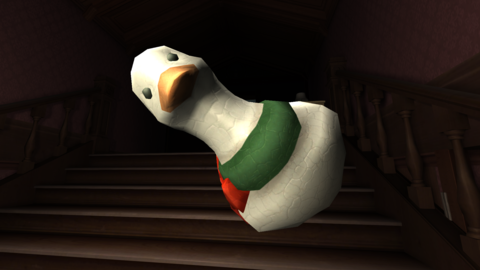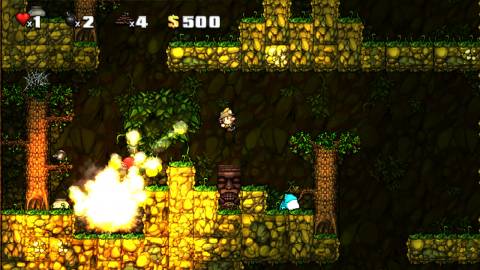The beginning of a new year is strange. We feel compelled to make changes, even if it doesn't really feel like anything's changed. It's not until we're a little ways into the year that it begins to sink in. You know, around time you stop writing 2013 and start writing 2014 on a regular basis.

I've been asked by a few people if I have any plans for 2014, at least insofar as my gaming habits. That's a question that needs some more thought, but I wouldn't be upset if I simply continued with one of my resolutions from last year: try new things. It sounds simple, but our time is valuable, and learning new things is hard. For many, games are a "fun" hobby, and it might not be exactly enjoyable to wrestle with the learning curve of a new genre or franchise.
But I implore you to do that. Whenever it feels like games are getting boring, I remind myself how many games I've never tried. That's the time to expand your worldview. It's why I played 999, Monster Hunter, and Fire Emblem in the last few years. None of those game types--visual novel, teamwork, strategy--would have been in my repertoire, and each of those games have opened my eyes (and gaming) library to brand new--games.
As a result, Dark Souls and Spelunky are the first two games I'm embracing in 2014. Sure, I played enough Dark Souls when it was released to get a sense of what it was about, but not really. I'm tired of thinking of Dark Souls as "the really hard game," and I've already found the joy of victory (and defeat) that comes with beginning to master a set of strict, unrelenting mechanic that reward patience and understanding. Spelunky's much the same way, but it also violates one of my core gaming habits: a game with an ending. Yeah, there is an "ending" to Spelunky, but it's not an ending in the traditional sense, and it's not really where the game ends.
I'll have more to write about the design DNA in those games and why it's been so satisfying to play both of them at the same time, but I'll save that for a later date. What are you doing in 2014?
Hey, You Should Play This
Please enter your date of birth to view this video
By clicking 'enter', you agree to Giant Bomb's
Terms of Use and Privacy Policy
And You Should Read These, Too
- "Why Gamers Can't Stop Playing First-Person-Shooters" by Maria Konnikova

There are psychological reasons driving why some games hook us more than others, even if that's an uncomfortable way to consider why we like what we like. It's not that simple, obviously, but Maria Konnikova has a fascinating article about the underlying drivers behind the first-person-shooter genre, breaking down the elements of the genre and talking to experts about what's appealing to so many of us. Game writers tend to use the term "immersion" without considering what the definition of immersion even is, but this story takes a very close look at the idea, and figures out why shooters are able to immerse most of us.
"'Flow,' writes Csikszentmihalyi, 'is the kind of feeling after which one nostalgically says: ‘that was fun,’ or ‘that was enjoyable.’' Put another way, it’s when the rest of the world simply falls away. According to Csikszentmihalyi, flow is mostly likely to occur during play, whether it’s a gambling bout, a chess match, or a hike in the mountains. Attaining it requires a good match between someone’s skills and the challenges that she faces, an environment where personal identity becomes subsumed in the game and the player attains a strong feeling of control. Flow eventually becomes self-reinforcing: the feeling itself inspires you to keep returning to the activity that caused it."
- "Perpetual Adolescence" by Ian Bogost

Gone Home was one of my favorite games from last year. No, seriously! I put it on a list and everything. But doing holiday traveling, I read an essay from Ian Bogost about what Gone Home not only says about game storytelling but storytelling in a larger cultural context. He suggests Gone Home represents a step forward for video games, but not only is it weird and sad that it's taken video games this long to take even this small step, but is Gone Home's impressiveness part of general, mainstream acceptance of adolescent standards in storytelling?
"What if Gone Home teaches us that videogames need only grow up enough to meet the expectations other narrative media have reset in the meantime? After all, we're living in an age in which the literary mainstream is dominated by young adult fiction anyway. Adults read series like Harry Potter and Twilight and The Hunger Games with unabashed glee. Comic book film adaptations have overtaken the cinema. What if games haven't failed to mature so much as all other media have degenerated, such that the model of the young adult novel is really the highest (and most commercially viable) success one can achieve in narrative?'"
- "A breakdown of 2013's most fascinating video game moment" by Doug Wilson

You're looking at the article that convinced me to start playing Spelunky. I didn't make it any further than the caves when Spelunky came out on Xbox Live Arcade. It didn't click, and the prospect of playing a game that had no "end' wasn't interesting. But, then, Doug Wilson wrote this incredible breakdown of a one-man eggplant run in Spelunky, an analysis easily readable by anyone who has never, ever played Spelunky before. Wilson not only makes high-level Spelunky play accessible to a newcomer, he conveys the excitement of what's happening in such a way that it makes you want to discover what's driving people to such extremes yourself. So I did.
"Once you have a Mystery Box, you must sacrifice it at an Altar. Again, luck plays a factor. Unlike most items, you can't carry a Mystery Box with you between levels. That means you need to wait until the game generates a level that contains both a shop carrying a Mystery Box and an Altar.
Only then, if all these pieces fall into place, will Spelunky reward the player with the mysterious Eggplant.
Until this summer, fans had failed to find any additional purpose behind the enigmatic item. However, with the arrival of the Windows port and the subsequent flurry of livestream activity, the legend of the Eggplant spread quickly, reviving speculation as to possible uses. Meanwhile, rumors began circulating; supposedly, the game was still hiding an undiscovered secret."
If You Click It, It Will Play
Like it or Not, Crowdfunding Isn't Going Away
- Kung Fury has, uh, "robots, dinosaurs, nazis, vikings, norse gods, mutants and a kung fu-cop."
- The Interactive Canvas wants to talk to game creators about their inspirations.
- Cara Ellison is raising money to do embedded journalism around the world.
Where'd These (Steam) Walking Dead Season Passes Come From?
- XRZ9N-?MZR2-IWQ59
- PJYAY-0W86I-DK?8R
- CQQ?I-H4ZQI-KKVMY
- ?VZ08-CKNCI-G07KA
- TDKL3-J6?2E-C22AJ
- T?KMC-L7ZX3-THXBR
- 4ZAGR-88?HM-EF7Z0
- X8WRX-ZRHB8-T?02Q
- KP6K4-P?XBC-YTY3Y
- 9M?7R-7P8GQ-M88ZX
Tweets That Make You Go "Hmmmmmm"
Played Gone Home today and enjoyed it, but was perturbed not to get an achievement for playing all the tapes.
— Mitch Krpata (@mkrpata) December 27, 2013
Gonna start parking outside of my local elementary school to get more 3DS street passes.
— Robert Ashley (@robertashley) January 4, 2014
I don't even know how to deal with people saying "an iPhone game can't be on a GOTY list." Sure it can, if it's really good. You're nuts.
— Susan Arendt (@SusanArendt) January 3, 2014
Oh, And This Other Stuff
- Kevin Morris argues it doesn't matter if eSports are a "sport." It's here to stay.
- Max Temkin of Cards Against Humanity explains the company's thought process on stock.
- James Waygood interviews the voice behind The Stanley Parable, Kevan Brighting.
- Zack Kotzer says the Ouya helped reawaken his desire to get high and play games.
- Jeff Vogel dives into Katawa Shouju and comes back surprised with what he found.
- Tevis Thompson' latest column at Grantland is about the addictive Candy Crush Saga.
- The New York Times has been running a series of excellent year-end gaming essays.
- Andrea Peterson interviewed Gabe Newell (part one, part two) about the company's structure.
- Indie Statik breaks down the big independent games to look forward to in 2014. Holy crap!
- Sean Haas provides a visual history of the PlayStation logo.